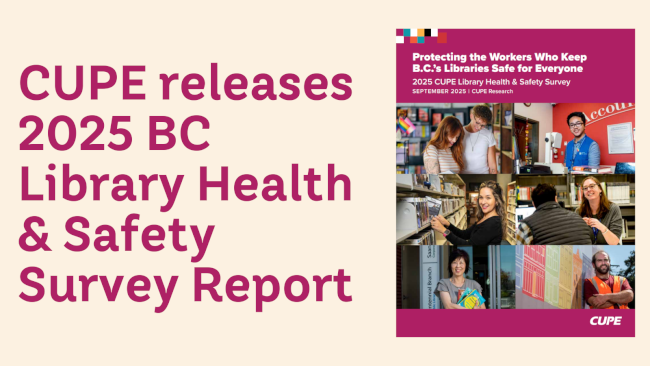
CUPE releases 2025 BC Library Health & Safety Survey Report
October 21, 2025
The Canadian Union of Public Employees (CUPE) has released the results of a survey aimed to document the health and safety experiences of library workers in British Columbia.
Highlights:
- 83% of library staff feel unsafe at work at least some of the time.
- 77% say understaffing makes their jobs more dangerous — lone shifts and skeleton crews leave them isolated and vulnerable.
- 65% have had to call 9-1-1 during a workplace incident.
- 90% regularly encounter biohazards like needles, blood, or human waste.
- 70% report receiving no debrief or follow-up after violent or traumatic incidents.
Executive Summary
Public libraries are the heart of our communities, but our new report reveals a heart in distress. The 2025 CUPE Library Health & Safety Survey, engaging nearly 600 workers from 75 communities, documents a systemic safety crisis that has escalated dramatically over the past decade.
Library workers, tasked with maintaining open and accessible spaces for all, are now operating on the frontlines of overlapping social emergencies, often without the training, support, or staffing levels required to feel safe in their workplaces.
Key Findings Paint a Dire Picture:
- Pervasively Feeling Unsafe: 83% of library staff report feeling unsafe at work at least some of the time. Only 16% of library staff say they feel safe often or most of the time.
- Staffing Levels Create Danger: An overwhelming 77% of workers directly link understaffing to their personal safety, a 20% increase since 2015. Lone and skeleton shifts have become commonplace, leaving workers isolated and vulnerable.
- Violence and Biohazards Are Routine: Workers are routinely exposed to verbal abuse, threats, and physical violence, with 65% involved in an incident serious enough to require calling 911. 90% of library staff are regularly exposed to dangerous biohazards like phlegm, used needles, blood, and human waste.
- Support Systems Are Failing: When incidents occur, the response is often inadequate. 70% of workers never receive a critical incident debrief after a traumatic event, and 57% see either no action taken or no communication following a report.
This report outlines the urgent need for investment in staffing, training, and support for the dedicated workers who protect this vital public service.
Ensuring library workers feel safe on the job is the fundamental first step in keeping libraries safe and accessible for everyone.
Add a new comment